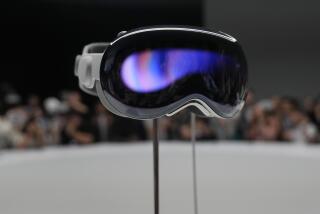Apple Can’t Wait to Unveil Tiny Computer : Technology: But the company’s hand-held ‘personal digital assistant’ may have a hard time living up to its billing.
- Share via
CHICAGO — Hoping to play midwife at the birth of what is touted as a $3.5-trillion “mega-industry,” Apple Computer today will preview its first “personal digital assistant,” a hand-held, pen-operated computer that functions like an intelligent note pad.
Code-named Newton, the videocassette-sized device will transform a handwritten message into neat block letters and carry out simple instructions. A user could simply write “Lunch with Bill on Friday,” and the appointment will be logged in an electronic date book.
Apple Chairman John A. Sculley speaks glowingly of how the “PDA” products will not only make the Cupertino company a major player in the consumer electronics industry, but will also help “solve major problems in the world.”
But Apple has quite a few challenges ahead before it can worry about solving world problems. For starters, the device won’t be ready for market until sometime next year, which makes today’s unveiling at the Consumer Electronics Show in Chicago premature even by the standards of the hype-driven computer industry.
Apple isn’t expected to have a working prototype ready for the show. In briefings this week, reporters and analysts were shown a plastic model and the technology was demonstrated using a specially designed personal computer.
Further, the product is unlikely to appeal to the average consumer because of its cost--somewhere between $600 and $1,000--and the fact that most of its functions will be business-oriented. The primary customers will likely be those who already own an Apple Macintosh, says Stewart Alsop, editor-in-chief of the trade newspaper Infoworld.
Apple isn’t the only company aiming at this new market. Hewlett-Packard, Sony and a recently announced alliance of Tandy and Casio are just some of the likely competitors.
Sculley acknowledges that no company is strong enough to dominate the “mega-industry” that is emerging from the marriage of computers, consumer electronics, communications and media. Apple will work with Sharp Corp. and others in developing the PDAs.
Although analysts such as Alsop doubt that Newton will make an immediate impact on Apple’s revenue, they’re extremely impressed with the technology. The Newton uses a high-powered RISC microprocessor, or computer-on-a-chip, that was developed by an Apple joint venture, and incorporates elegant, easy-to-use software of the kind that made the Apple Macintosh famous. The Newton’s small screen has icons at the bottom, which when touched with a pen call up an electronic appointment book, or an “intelligent assistant” that has already determined what the user might want to do with the message.





